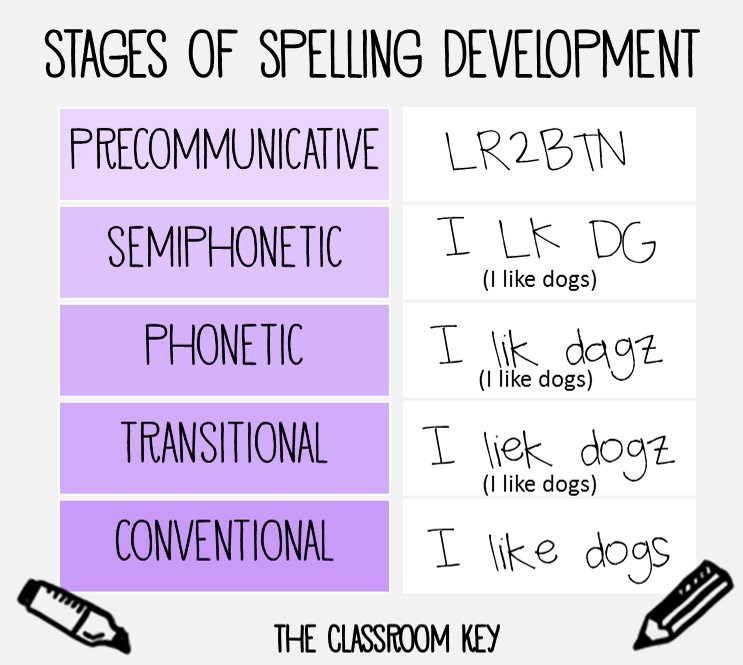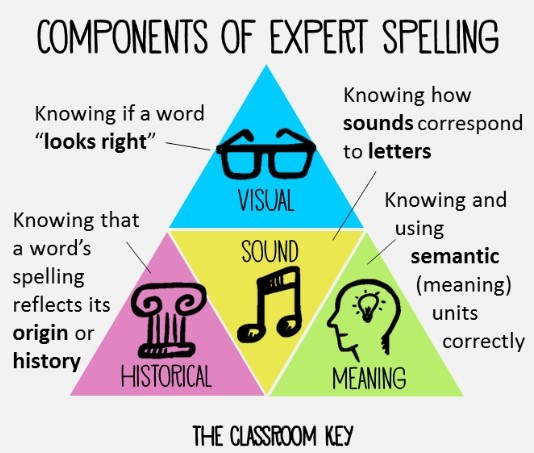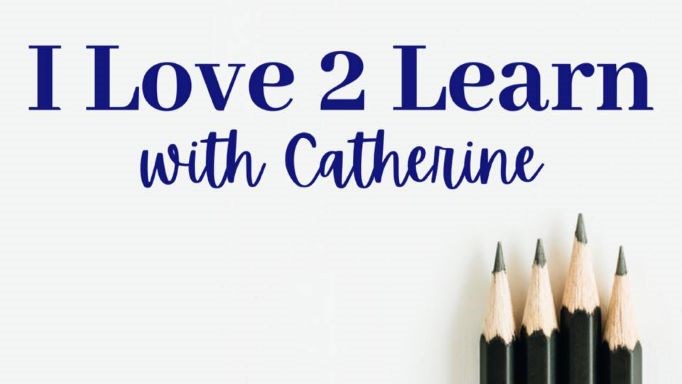Stages of Spelling Development
Monday, September 26, 2022 by Catherine Gilliland | Spelling
 I am always amazed that I can observe one child who is learning to write and spell in one place and time and another child in another location and time and the two move through the same progression in the development of their skills! Like linguist Charles Read (1975), I have observed that even pre-reading children begin spelling words by inventing their own spellings based upon their current understanding of the sound contained in the word they are attempting to spell and the letter sounds about which they currently have knowledge. As their knowledge base expands children move gradually through the five stages of learning to spell.
I am always amazed that I can observe one child who is learning to write and spell in one place and time and another child in another location and time and the two move through the same progression in the development of their skills! Like linguist Charles Read (1975), I have observed that even pre-reading children begin spelling words by inventing their own spellings based upon their current understanding of the sound contained in the word they are attempting to spell and the letter sounds about which they currently have knowledge. As their knowledge base expands children move gradually through the five stages of learning to spell.
Charles Read concluded that, by and large, "learning to spell is not a matter of memorizing words, but a developmental process that culminates in a much greater understanding of English spelling than simple relationships between speech sounds and their graphic representations."
J. Richard Gentry (1982), using Read's research as a foundation, describes five stages: precommunicative, semiphonetic, phonetic, transitional, and correct.
-
Precommunicative stage
The child uses symbols from the alphabet but shows no knowledge of letter-sound correspondences. The child may also lack knowledge of the entire alphabet, the distinction between upper- and lower-case letters, and the left-to-right direction of English orthography. -
Semiphonetic stage
The child begins to understand letter-sound correspondence and that sounds are assigned to letters. At this stage, the child often employs rudimentary logic, using single letters, for example, to represent words, sounds, and syllables (e.g., U for you). -
Phonetic stage
The child uses a letter or group of letters to represent every speech sound that they hear in a word. Although some of their choices do not conform to conventional English spelling, they are systematic and easily understood. Examples are KOM for come and EN for in. -
Transitional stage
The speller begins to assimilate the conventional alternative for representing sounds, moving from a dependence on phonology (sound) for representing words to a reliance on visual representation and an understanding of the structure of words. Some examples are EGUL for eagle and HIGHEKED for hiked. -
Correct stage [or Conventional]
The speller knows the English orthographic system and its basic rules. The correct speller fundamentally understands how to deal with such things as prefixes and suffixes, silent consonants, alternative spellings, and irregular spellings. A large number of learned words are accumulated, and the speller recognizes incorrect forms. The child's generalizations about spelling and knowledge of exceptions are usually correct.
Gentry, J. Richard. "An Analysis of Developmental Spelling in GNYS AT WRK." An Analysis of Developmental Spelling in "GNYS AT WRK" on JSTOR, 1982.
Read, Charles. CHILDREN'S CATEGORIZATION OF SPEECH SOUNDS IN ENGLISH. Urbana, IL: ed112426.tif.pdf, 1975.
For more information see Reading Rockets "Invented Spelling and Spelling Development".
Soft Skills: Family Night
Friday, September 16, 2022 by Catherine Gilliland | Soft Skills
How Family Nights Strengthen Soft Skills
Family nights were something that my kids looked forward to each week! As we reflected on our experiences during family night, we were able to identify many soft skills that were developed during this precious family time!
As we planned these nights, we were careful to plan experiences that were special. What made experiences special for our family? Ones that were uncommon for our children, that every family member could enjoy in their own way, that strengthened our family team, that fostered good memories, and ones that enhanced interpersonal relational and communication skills. Creating experiences at times presented challenges because there was a 15-year span of ages between the oldest and youngest children in our family, the kids had a variety of interests, and there were both boys and girls.
As parents, we kept our ears and eyes open for ideas that we could implement directly or use as a springboard for our own version. Sometimes we used the internet to search, sometimes the title of a book or content of a speaker would spark an idea for us. The key for us was to keep our family vision goals in mind and be creative!
To spark your own creativity in creating special family night experiences for your crew, you might consider any of the following: play team-building games; participate in a ropes course; go ziplining; take a nature scavenger hunt; attend a movie or play at a theater; learn backyard games such as kickball, softball, bocce ball, croquet, or badminton; volunteer for a special cause; decorate Christmas cookies; create balloon sculptures; play silly "youth group" games; take a walk at a special place or walk in a dark location to gaze at the stars; attend a special event; play in the snow together (stage an epic snowball "fight",building a snow fort; create a cluster of snowmen, snow ladies, and pets to represent your family); decorate for a holiday together (let kids create some of the decorations); stage a family impromptu speech night with easy, fun topics.
Remember to incorporate into your family night plenty of laughter, affirmations, loving embraces, and document the time by taking plenty of spontaneous pictures! You may even want to consider ending each family night with a dedicated time of praise from one family member to another. Be ready to witness your family relationships grow and your children become increasingly equipped for successfully navigating life beyond the home!
What do we really know about spelling?
Friday, September 16, 2022 by Catherine Gilliland | Spelling
What do we really know about spelling?
 Photo Credit: The Classroom Key
Photo Credit: The Classroom Key
Is spelling instruction important? Is spellcheck enough for those who struggle with spelling? Spellcheck is undeniably a helpful resource; however, the quality of one's spelling skills impacts school success and ultimately, success in life itself. Whether fair or not, our misspelled words can make us look "bad" in front of others. More than impacting our public image, poor spelling can contribute to a poor self-image and struggles with reading proficiencies. The most recent research shows that serial sub-lexical skills [intentional and structured phonics, spelling, and handwriting] are foundational for the development of reading brain circuitry. (Gentry, Richard. "Why Spelling Instruction Should Be Hot in 2022—2023". Psychology Today blog, Jan. 5, 2021)
What causes problems with spelling? Two systems contribute to spelling acuity: the visual and the auditory systems. Weaknesses in either of these systems contribute to problems with spelling. Is that the end? Thankfully, NO! Both of these systems can be strengthened and therefore improve spelling proficiencies, making spelling difficulties a thing of the past.
Has your student peered at a word with a quizzical look on their face? They are using their visual system to see if their written word "looks right". With increasing reading exposure, a student's ability to visually determine a word's correct appearance grows. Auditory system acquity grows progressively as a student is exposed to letters or letter combinations and their related sounds. The pace of a student's visual and auditory system development is tied directly strong phonics based reading systems. There is mounting evidence that points to the importance of direct spelling instruction being provided in tandem with reading instruction. Word reading become automatic which further propels growth in reading comprehension.
Check back on the next three Mondays for more information on the following spelling topics: stages of development, methods of spelling: memorization vs. sounds to letters, and how to structure the process of spelling instruction.


